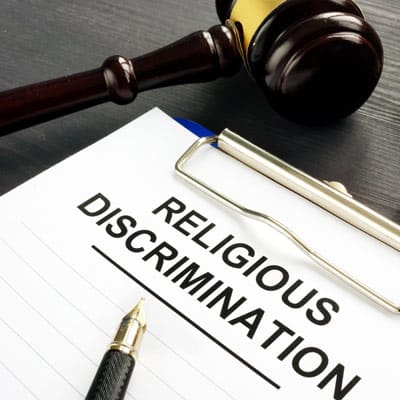
For some individuals, practicing their religious faith can cause conflicts with their work schedule. To observe certain religious holidays or a weekly Sabbath day, a worker may need to request a day off from work or otherwise modify their work schedule. Some employees are denied paid leave in these circumstances.
Reasonable Accommodations
Both federal and state anti-discrimination laws, including the New Jersey Law Against Discrimination, prohibit discrimination on the basis of one’s religion. Under these statutes, employers must make “reasonable” accommodations to allow employees time off for religious observances. As such, employers must make a bona-fide effort to accommodate the need of an employee to participate in certain religious observances.
Reasonable accommodations can include:
- Granting an employee additional vacation or paid leave
- Allowing an employee to modify their work schedule to work later or earlier hours
- Allowing employees to switch shifts
- Allowing an employee to take unpaid leave
- Allowing an employee to exhaust paid leave, including accrued vacation time
In many cases, courts have found employees are not necessarily entitled to use their vacation pay or other types of paid leave as their religious accommodation. Workers may be allowed to take unpaid leave instead.
Undue Hardship
Employers are not obligated to honor every religious accommodation request. When accommodating an employee would result in undue hardship, courts will find there is no obligation to honor the request. Courts determine if undue hardship is present through consideration of the unique facts of each case. Federal courts use a standard that favors employers by defining undue hardship broadly to include any accommodation placing more than a minimal burden on the employer. Accommodations resulting in the need to hire other labor or a decrease in productivity will be found to produce undue hardship.
In contrast, New Jersey state courts strongly limit the meaning of undue hardship to include only accommodations requiring “unreasonable expense or difficulty” on the part of the employer. To satisfy the definition of undue hardship, the employer must prove the requested accommodation would unreasonably interfere “with the safety or efficient operation of the workplace.”
State vs. Private Employers
Individuals working for state employers cannot be forced to work on the eleven legal state holidays, which include Good Friday and Christmas. New Jersey state employees also do not have to work on Saturdays after noon or on Sundays. Private employers do not have to provide any paid days off for holidays. There is also no requirement forcing private employers to allow employees to take holidays off with or without pay.
Mount Laurel Employment Lawyers at The Law Offices of Leo B. Dubler III, LLC Protect the Rights of Employees Throughout New Jersey
If your employer has illegally denied a request for time off to observe a religious holiday, you may be entitled to compensation. Schedule a free consultation with an experienced Mount Laurel employment lawyer at The Law Offices of Leo B. Dubler III, LLC today by calling 856-235-7075 or submit an online inquiry form. From our offices in Atlantic City and Mount Laurel, we assist clients across South Jersey, including the areas of Cherry Hill, Camden County, and Burlington County, New Jersey.






